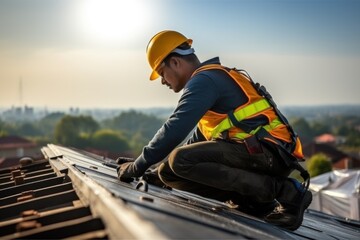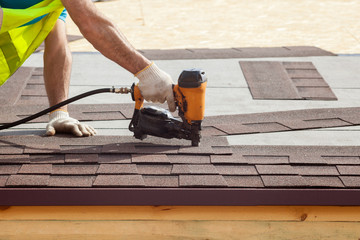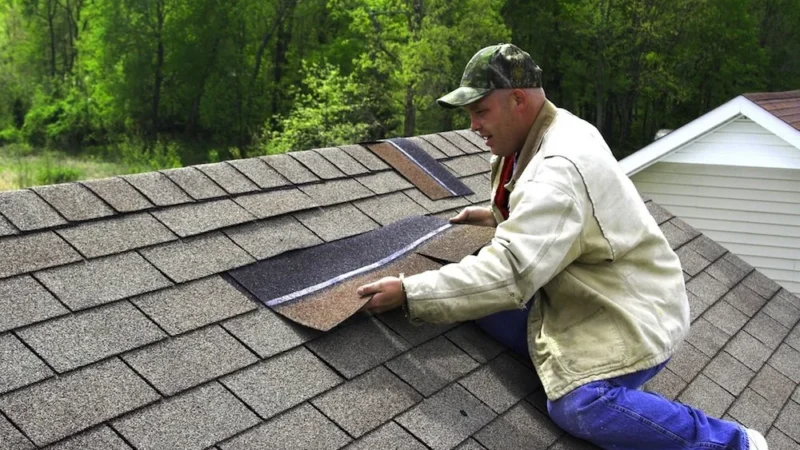What Does a Roofer Do?
A roofer is a person who builds and repairs the roofs of buildings. This highly technical job requires special training and building codes and practices knowledge.
They often work with other construction professionals and must have excellent collaboration skills. They also need to complete ongoing training and safety courses. Contact SYBO Roofing and Construction of Punta Gorda LLC now!

Roofers are critical to keeping homes and buildings safe and dry. They install and repair roofs as well as maintain the existing ones. This rewarding career allows for good pay and room to grow within the trade. It also requires a high level of physical fitness and an ability to work at heights. Those who want to pursue this trade should take steps to understand the qualifications necessary for getting started and find the best training programs available.
There are three main ways to become a roofer: college courses, an apprenticeship, or on-the-job training. Choosing the right route for you will depend on your education, financial situation, and how quickly you want to learn the trade. College courses are a good option for those with a high school diploma or GED certificate who wish to gain formal education in roofing. These courses will teach you the roofing basics and how to use various tools and equipment safely. Apprenticeships are another way to gain experience in the trade and earn a good salary while you learn. This will give you valuable hands-on skills and allow you to acquire the industry’s required certifications.
Lastly, many roofing companies offer a variety of training courses for brand-new roofers. These courses are typically less expensive than an apprenticeship and will provide the skills needed to start your career on the right foot. Taking a course from a reputable company like TRI will ensure that you are trained in the most current best practices for the industry.
Once you have completed your training, it’s important to maintain your credentials and remain current on any industry changes. Regularly attending meetings and completing continuing education courses will help you stay competitive and ensure that your skills are up to date. You can also join a professional trade organization to network with other industry members and get access to resources and training.
Roofers work in a variety of weather conditions and must be able to perform well regardless of these weather extremes. They must also be able to interact effectively with other members of the roofing team, as well as clients. Roofers must be able to use skills like coordination and active listening.
In addition, roofers must have good attention to detail and a strong willingness to do quality work despite the weather. They should be able to navigate various roofing scenarios and be comfortable working with different materials, including cedar shingles. People who choose to be roofers usually have a high score on the Realistic scale, which means they prefer practical, hands-on problem-solving. This occupation also appeals to those who value Support, Independence, and Working Conditions.
Roofers carry out a variety of different tasks. These include inspecting roofs and providing clients with estimates on labor costs and materials. They also install vapor barriers and insulation to create a more waterproof seal. In addition, they may also be responsible for repairing and replacing sections of roofs that are damaged or rotting. Some of the more specialized jobs performed by roofers may include installing metal flashing, gutters, chimneys, and shingles. In some cases, they may even be required to complete demolition work to prepare the site for new roofing.
One of the most important skills a roofer should have is excellent attention to detail. This will allow them to follow safety standards and purchase the correct materials. In addition, it will help them keep track of their inventory and ensure that they have enough supplies to finish each job.
Another important skill is being able to communicate effectively with other people. Roofers often work with a team of other construction professionals, so it is essential that they can communicate clearly with each other. This will allow them to solve problems quickly and efficiently.
It is also important for roofers to have good physical fitness. This is because they will work outside and use heavy equipment for long periods. This can be a challenging job for those who are not used to such physical activity. Nonetheless, it can be very rewarding in the long run.
Lastly, roofers need to have good customer service skills. This is because they will often work on other people’s property and must always be courteous. In addition, roofers must work well with others and stay focused on the task.
To become a roofer, consider attending a training program. These programs usually last a few years and require extensive on-the-job training. In many cases, these programs can even lead to certification as a journeyperson roofer. This will allow you to get more work and increase your salary.
Roofers earn a salary of around thirty-eight thousand dollars per year. Those with advanced degrees can earn more, and those who manage other roofers can receive a higher pay scale. In addition, geographical variations impact Roofer’s salary levels due to factors such as cost of living and industry demand.
Among the top 10 cities for roofer salaries, Lead led the way with a salary 25.0% above the national average. Nevertheless, these cities have a relatively low cost of living, which may limit the opportunities for wage advancement.
A rower’s job requires physical labor, including climbing and working with large or heavy materials. It also involves a lot of bending, kneeling, and navigating steep slopes. It is not an ideal career for people with back problems because the constant squatting can lead to serious injury. Furthermore, the work is often performed in warm weather, which can strain the body. However, it can be an excellent job for those who like to work with their hands and have a sense of adventure.
As the name suggests, synthetic roofs are manufactured to mimic the look of natural roofing. Often, they also offer added properties such as impact resistance for locations that experience large hail and uplift resistance in high wind conditions. They can be made of various materials, including recycled polymers, rubbers, clays, plastics, and asphalt. This wide range of materials allows for various aesthetic choices and helps the budget-oriented consumer find a great fit.
Aside from their durability, another reason homeowners are increasingly choosing synthetic shingles is their environmental friendliness. These shingles are produced with recycled material; many are even completely recyclable after use. Additionally, the manufacturers of these shingles often incorporate advanced UV inhibitors that help decrease wear from the sun’s harsh rays.
Many of these shingles are backed by an industry-leading 50-year warranty, which adds further value and peace of mind to the homeowner. They are much lighter than their authentic slate and wood alternatives, making them easier to install. Plus, they don’t require additional reinforcement to the home’s framing like a traditional slate or wood roof.
While it may seem counterintuitive, synthetic shingles are more energy efficient than their natural alternatives. This is because the advanced UV inhibitors in these shingles help reflect the sun’s heat and rays. This reduces the demand for air conditioning systems and decreases the infamous “heat-island” effect experienced in heavily populated areas.
In addition, these shingles’ safety features are unparalleled compared to cedar and slate. Unlike those two popular roofing options, they are Class-A fire-rated, with the highest possible rating for roof materials. That means they are not flammable and resist the spread of fire, providing you with the utmost safety and protection for your family.
If you’re considering a new synthetic roof, we recommend you consult a professional roofer to determine your best option. Our team of experts is ready to guide you through the entire process. To start, schedule your free roofing inspection by clicking the button below!






